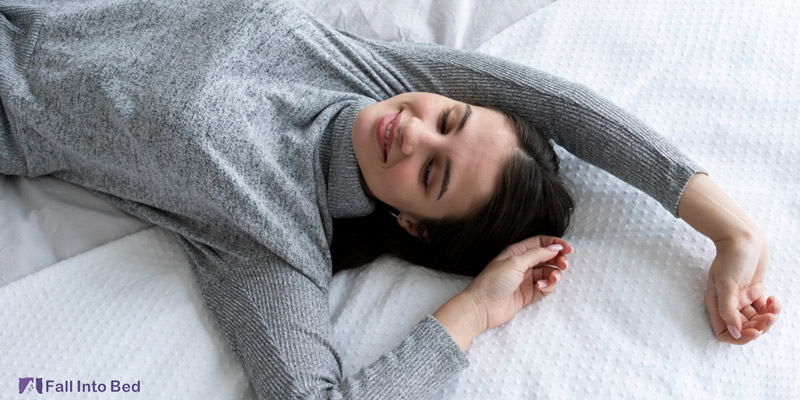There’s a popular belief that sleeping in a straight position can actually make you taller. It’s a thought that many people have, especially those still growing or looking for ways to maximize their height.
In this article, we’ll explore whether sleeping straight has any impact on your height and what really matters for growing taller. We’ll look into how sleep affects growth hormone levels, the role of sleep quality and what you can do to support healthy growth. Let’s dig into the facts and see if this common belief holds up under scrutiny.
Does sleeping straight make you taller?
Firstly, we should indicate that there is no medical research or evidence that backs up this theory that sleeping with legs straight makes you taller.
Your height is mostly affected by your genetics, hormones and the environment you live in. However there is no doubt that sleep plays a role in height and growth.
During sleep, body releases more of the growth hormone (HGH) in pulses, and this mostly occurs in the deep stage of your sleep cycle. This hormone directly affect your bones and muscle tissues, resulting in growth in both height and weight.
The effect of sleep on height
So, unfortunately “does sleeping straight make you taller” remains unanswered with no evidence to back it up, we can’t deny the importance of sleep in growth.
Sleep Duration
Adequate sleep is important for maintaining optimal levels of growth hormone. Children and teens require more sleep than adults for proper growth. A study shows that the most amount of HGH is released during 11 p.m. and midnight.
So it’s important to have been in deep sleep by this time. Sleeping before 10 p.m. is recommended, especially for children and teenagers.

Growth Hormone Production
Sleep, particularly deep sleep, stimulates the release of growth hormone, essential for growth and cell regeneration.
Body Repair and Development
Sleep supports tissue repair, muscle growth, and bone development, crucial for increasing height during childhood and adolescence.
Impact of Sleep Deprivation
Lack of sleep can reduce growth hormone production, potentially affecting overall growth and development. When we don’t get enough sleep, it disrupts the release of growth hormone, which is essential for growth and development, especially in kids and teens. This hormone is mostly released during the early stages of deep sleep. Without enough rest, growth hormone levels drop, which can hinder physical growth and development since the body isn’t getting the signals it needs for bone and tissue growth.
Lack of sleep also affects our metabolism, which can impact muscle growth and bone strength. Over time, this can weaken the immune system and affect cognitive functions, impacting overall health. That’s why getting consistent, quality sleep is so important for maintaining growth hormone levels and supporting healthy development.
Sleeping Postures That Help Height Growth
There are some positions that help stretch the muscles, which can result in growing taller. Keep in mind that simply sleeping alone won’t have a significant impact on your height:
Starfish position
Starfish position is when you sleep on your back with your hands above your head, looking like a starfish. This position help stretch the spine, enhancing a better posture.
The starfish position is also recommended to those who are worried about wrinkles during sleep. Sleeping on your back keeps the face from being pressured to the pillow which results in small wrinkles over time.

Side sleeping
Sleeping on your side with your legs straight and a pillow between them, helps your spine to stay aligned. It also reduces stress on your lumbar region and keeps your legs and torso stretched.
Fetal position
Though this position is not medically found to be helpful for growth, it can be a replacement for side sleeping if it’s not comfortable for you.
In this position, you sleep on your side with your knees bent, towards your chest. Make sure your back is straight, and avoid twisting your torso too much. A body pillow can help maintain proper alignment and provide additional comfort.
Tips for help you grow taller
As we mentioned earlier, your height is mostly affected by your genetics. However there are things that might help or keep you from reaching the maximum height your genetics offer you:
- Balanced Diet: Ensure a diet rich in essential nutrients like proteins, vitamins, and minerals. Key nutrients include calcium, vitamin D, and zinc, which are important for bone health and growth.
- Adequate Sleep: Aim for 7-9 hours of good-quality sleep each night. Sleep is crucial for growth hormone production and overall health.
- Regular Exercise: Engage in regular physical activity, including activities like swimming, running, and stretching exercises. Exercise supports bone health and muscle growth.
- Proper Posture: Maintain good posture to avoid any strain on your spine and bones. Good posture can result in a healthy back and alignment.
- Stay Hydrated: Drink plenty of water to support overall health and bodily functions, including growth.
- Avoid Smoking and Excessive Alcohol: These habits can negatively impact your growth and overall health.
Sleep is one of the most important factors when it comes to growth, especially in children and teenagers. And even though sleeping straight might not directly make you taller, The effects of a good night sleep cannot be overlooked. With a healthy and rich diet, exercises and good sleep you can reach your maximum height, depending on your genetics.
Sweet growing dreams!








